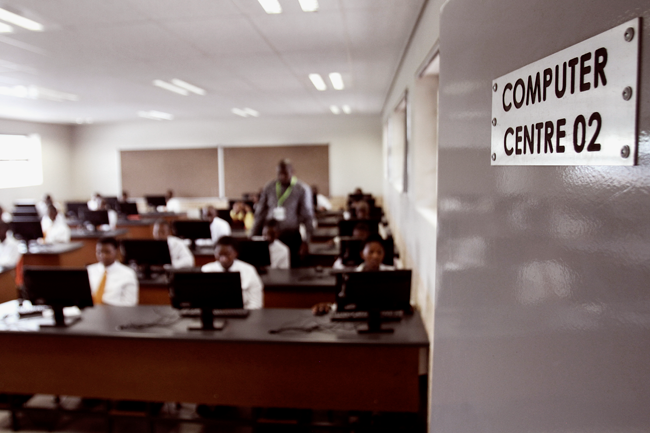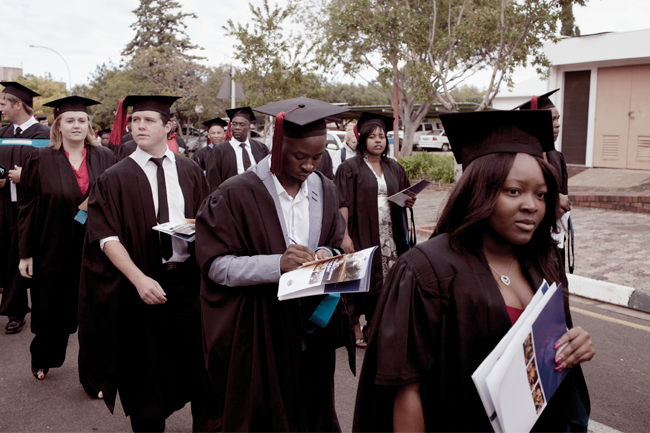Students at the University of Cape Town’s Graduate School of Business (GSB) are thrown ‘into the deep end’, says director Mills Soko, when asked about his school’s method of leadership teaching. ‘We don’t expect them to just sit in the classroom and absorb theories about how to manage and lead – although there is plenty of that too. We get them out in the world where they have the opportunity to try out their new-found skills working with real businesses.’
Business schools traditionally have a more ‘real world’ than ‘ivory tower’ approach, in the sense that their programmes combine the university microcosm of academia with practical, hands-on learning in the business world. This approach is becoming increasingly crucial as the next generation of business leaders face more complex challenges than previous generations. They need to be in touch with the nitty-gritty of daily life in Africa and work towards solving societal problems – in addition to having excellent administrative and business skills, being willing to try new things and push innovative ideas while being role models in terms of transparency and corporate citizenship.
Soko explains that the GSB aims to create leaders who are able to ‘think big’, who are ‘entrepreneurial in mind and action’ and who are ethical, ‘who really understand from the inside out that what they do needs to be in the service of profit, but also always in the service of building a better world, improving the lives of ordinary people and communities where they operate’, he says. ‘The scale of the development challenges in Africa means that this really is a non-negotiable in business today. At the same time, many of the challenges facing economies in emerging markets are around the ability to do simple things right – to get back to good business basics.’
The basics are being taught in business schools around the world but those in Africa are adding local context as an extra ingredient. According to Enase Okonedo, dean of Lagos Business School (LBS), which is the graduate business school of the Pan-Atlantic University in Nigeria: ‘A distinguishing factor is how we adapt to meet the specific needs of Africa. All our programmes are designed to address the sometimes peculiar circumstances in which businesses operate in Nigeria and Africa. There are a lot of challenges that developed nations do not have to contend with.’
In 2014, Okonedo told the UK’s Financial Times that the school had to generate its own electricity for continuous supply and extract water from a borehole on campus and purify it on site. Today, she says, ‘there have been improvements in the operating environment in the years since, but we still need to ensure we have back-up to the electricity supply to ensure uninterrupted power. Across the continent, we have seen improvements in governance and serious efforts being made to tackle corruption. Faculty have to be knowledgeable about how these challenges can be successfully overcome through research and development of local case studies. Executives who come on programmes at the school therefore become more adept at tackling these issues’.
LBS became the first West African institution to be accredited by the Association to Advance Collegiate Schools of Business in December 2016. It’s one of only four African schools ranked among the Financial Times’ top 70 business schools in the world – the others being Pretoria University’s Gordon Institute of Business Science, UCT’s GSB and the University of Stellenbosch Business School (USB).
‘To ensure relevance, a certain proportion of the cases used are on companies operating in Africa; we believe we have the largest collection of case studies on African companies,’ says Okonedo.
The students benefit from experienced lecturers, sometimes even high-profile instructors such as Africa’s richest man, Aliko Dangote. According to Nigerian online newspaper the Cable, the cement billionaire taught business and agriculture to executive participants of the LBS Owner Manager Programme in August 2016.
‘Furthermore, learning at the school involves experiential learning where participants on several programmes are engaged in real-world situations through not only interaction but also participating in business practices,’ says Okonedo.
At Wits Business School (WBS) in Johannesburg (which in July appointed former South African Finance Minister Nhlanhla Nene as interim director), MBA students are given a taste of the real business world in an entrepreneurial competition during their orientation week. The Famous Brands Challenge – similar to the business reality shows Dragons’ Den (BBC) and Shark Tank (M-Net) – pitches groups of students against each other in the race to come up with the most innovative and lucrative new ventures for the continent’s largest branded food services franchisor.
Conrad Viedge, MBA director at WBS, said in a statement: ‘One of the reasons we believe the [Famous Brands] Challenge is so worthwhile is that it poses to the students a real, live business problem. This is not an academic exercise, it is one that is judged by executives who scrutinise the proposals from a “real” South African and African market perspective.’
Strathmore Business School (SBS) in Nairobi, Kenya, also strives to combine academic rigour with real-life application. In line with its mission (‘Service to society through developing virtuous leaders by providing world-class executive management education in a local setting’), the offering includes an MM in agribusiness, MSc in development science and MBA in healthcare management. There’s also an executive ‘Doing Business In Africa Programme’, which aims to demystify the continent for global executives and provide insight into what drives economic activity in Africa.
In March 2016, SBS launched its Centre for Sustainability Leadership. Its pioneering African Sustainability Leadership programme – the first of its kind in the region – targets business leaders across all sectors, especially the fast-moving consumer goods, banking and manufacturing industries. George Njenga, SBS founding dean, says: ‘It’s our responsibility to train and equip our current and future business leaders with a strong understanding of and the solutions to the challenges we face around sustainable development.’
Rhodes Business School (RBS) in Grahamstown, South Africa, has long subscribed to this idea. Director Owen Skae explains how the school integrates its motto, ‘Leadership for Sustainability’, throughout its teaching. ‘Irrespective of the module that is being taught, our MBA must incorporate this theme. This we do via our 4E model – economy, ethics, ecology and equity.
‘For example, in management accounting, our students engage with natural capital accounting and the question “how should performance measures in relation to human rights be addressed?”. Ultimately our focus is not on teaching how much money a business should make, but how it makes its money.’
RBS has a service-learning component and students are required to spend time at a township organisation, the Assumption Development Centre in Joza, to mentor small-business owners. The USB in Stellenbosch and the GSB in Cape Town have taken this approach one step further by establishing a presence in the informal economy.
‘USB is a place of both cutting-edge, high-end management knowledge and a source of social development and hope,’ says Piet Naudé, USB director, referring to the school’s Small Business Academy, which was launched in 2012 to provide business education to entrepreneurs in low-income communities.
The academy upskills small-business owners from Khayelitsha, Mitchells Plain and neighbouring communities during a nine-month programme that culminates in a certificate (NQF Level 5) from Stellenbosch University. But it’s not only the SME owners who benefit – USB students also learn valuable lessons through social engagement projects with the SMEs.
Soko says: ‘As a business school or a university, it can be tempting to retreat into our classrooms and our heads, and universities are often accused of this. He explains that his school recently established a township satellite base [Phillippi Village] as a revolu-tionary way for students to engage with real-world challenges while also assisting in bridging geographic and economic divides.
‘Working with local entrepreneurs helps our students develop empathy and resilience, and helps open their eyes to wider perspectives – all of which are vital attributes for the modern leader, especially one operating in an emerging market,’ says Soko.
‘At Philippi Village, we get to practise what we preach. Working with discomfort, we believe, will be a crucial part of forging a new reality for business and society from the ground up. The vision is to increase the relevance and impact of the school by working with entrepreneurs in the community to co-create new solutions to African challenges.’
This way of throwing students into the deep end could become a game changer for other business schools striving to equip future leaders with the skills to meet the continent’s – and the world’s – challenges head on.






